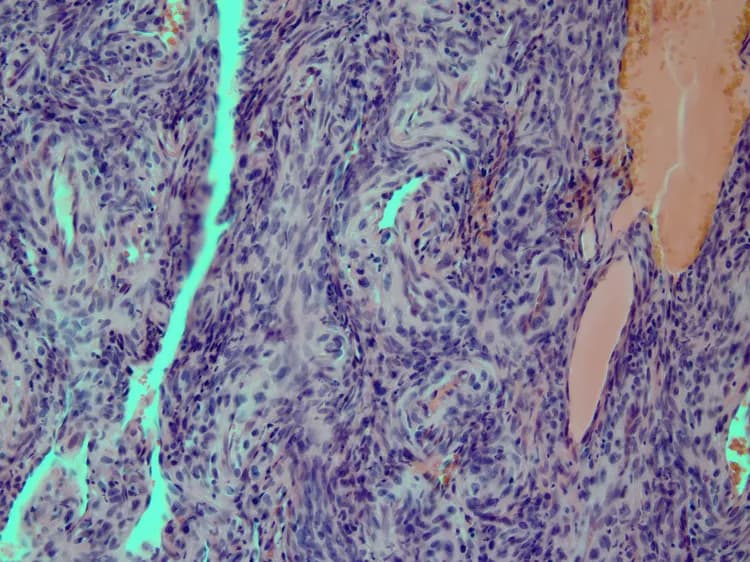What are the other Names for this Condition? (Also known as/Synonyms)
- MPC (Myopericytoma) Tumor
What is Myopericytoma Tumor? (Definition/Background Information)
- Myopericytoma (MPC) Tumor is a rare, benign tumor forming from cells which surround the blood vessels. This tumor frequently involves the lower limbs; other affected areas include the head and neck region
- Individuals in their mid-adult phase are commonly affected. Occasionally, an individual may experience a painful nodular mass at the site; although, most MPC Tumors are asymptomatic and painless masses
- Surgical treatment of the tumor is generally performed, through a complete excision of the tumor. The prognosis of Myopericytoma Tumor is excellent in most cases
Who gets Myopericytoma Tumor? (Age and Sex Distribution)
- Myopericytoma Tumor may form in individuals of all age group; however, the peak age range is the mid-adult period, particularly between the ages 35-40 years
- Males are affected more than the females
- No specific racial or ethnic preference is observed
What are the Risk Factors for Myopericytoma Tumor? (Predisposing Factors)
- No definitive risk factors for Myopericytoma Tumor are evident
- In some cases, it may be linked to an external injury or a trauma
It is important to note that having a risk factor does not mean that one will get the condition. A risk factor increases ones chances of getting a condition compared to an individual without the risk factors. Some risk factors are more important than others.
Also, not having a risk factor does not mean that an individual will not get the condition. It is always important to discuss the effect of risk factors with your healthcare provider.
What are the Causes of Myopericytoma Tumor? (Etiology)
- The exact cause of Myopericytoma Tumor formation is unknown
- The tumor is thought to occur spontaneously, or as a reaction to some injury or trauma
What are the Signs and Symptoms of Myopericytoma Tumor?
The signs and symptoms of Myopericytoma Tumor may include:
- MPC Tumors are usually painless. They may become painful mass, only after many years
- The tumor grows at a slow rate, and may be found below the skin surface or deep inside the body tissues
- They may be present as well-defined, small and single, or sometimes multiple nodules. In rare cases, the MPC Tumors may occur simultaneously at other body parts
- The most common location of these lesions are the fingers, with other locations being the neck, head, and body trunk region
How is Myopericytoma Tumor Diagnosed?
A diagnosis of Myopericytoma Tumor may involve:
- Physical exam with evaluation of medical history - it is usually difficult to detect them, due to their small size and benign behavior
- CT and MRI scans of the affected region
- Histopathological studies conducted on a biopsy specimen, which is obtained from the tumor location. A pathologist then studies the specimen sample under a microscope to arrive at a diagnosis
- Since the tumor is rare, other tumor types should be considered as part of a differential diagnosis, before arriving at a definitive diagnosis.
Many clinical conditions may have similar signs and symptoms. Your healthcare provider may perform additional tests to rule out other clinical conditions to arrive at a definitive diagnosis.
What are the possible Complications of Myopericytoma Tumor?
The possible complications of Myopericytoma Tumor include:
- Recurrence of the tumor after surgery; although, this is reportedly a very rare occurrence
- Damage of vital nerves, blood vessels, and surrounding structures, during surgery to remove the tumor
How is Myopericytoma Tumor Treated?
The treatment for Myopericytoma Tumor is decided on case-by-case basis.
- If there are no symptoms due to MPC Tumor, then nonsurgical treatment measures are adopted. However, periodic observations are maintained
- Marginal surgical excision and removal of the entire lesion is normally sufficient treatment, if the healthcare provider recommends a surgery
- Post-operative care is important: A minimum activity level is to be ensured, until the surgical wound heals
How can Myopericytoma Tumor be Prevented?
Current medical research has not established a method of preventing Myopericytoma Tumor formation.
What is the Prognosis of Myopericytoma Tumor? (Outcomes/Resolutions)
- The prognosis of Myopericytoma Tumor is generally excellent, when the lesions are small and found below the skin surface. In such cases, their recurrence risk can also be completely avoided with a complete surgical excision
- The probability of MPC recurrence is very low, after their surgical removal. However, periodic follow-up checkup with screening might be required
Additional and Relevant Useful Information for Myopericytoma Tumor:
- Before the discovery and classification of Myopericytoma Tumors, these tumors were diagnosed as hemangiopericytomas or solitary myofibromas
- The MPC Tumor is characterized by concentric arrangement of oval-spindle shaped cells around the blood vessels of the tumor called perivascular growth
Related Articles
Test Your Knowledge
Asked by users
Related Centers
Related Specialties
Related Physicians
Related Procedures
Related Resources
Join DoveHubs
and connect with fellow professionals



0 Comments
Please log in to post a comment.